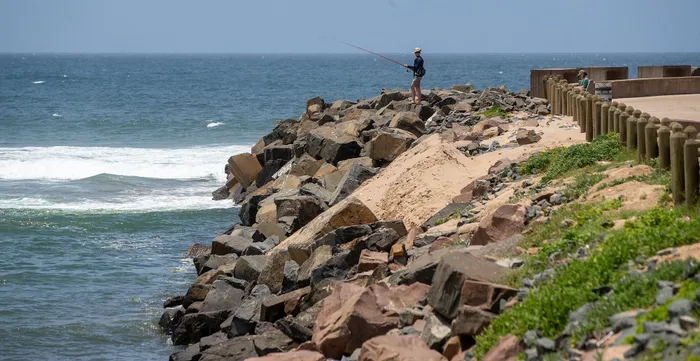21 out of 23 Durban beaches remain open to public

A fisherman at the mouth of the uMngeni river despite the fact that the eThekwini Municipality has prohibited recreational activities, including fishing due to a sewage effluent discharge. Photographer: Leon Lestrade / Independent Newspapers.
DURBAN’S subsistence fisherfolk will have to find alternative angling spots this weekend after four popular beaches were closed as a result of high E.coli levels.
Environmental activist Desmond D’Sa said the affected beaches were Blue Lagoon, uMhlanga, Ansteys and Cuttings.
He said earlier this week eThekwini mayor Cyril Xaba announced that only one beach was affected but there were many others which were not mentioned, said D’Sa.
“Whether it's acceptable levels or not, the pure fact that it contains contaminants of E. coli tells you a different story. And I don't know how many of those visitors that have come are well enough to go back home or whether they’re sick. But what I do know, and what I'm prepared to stand up for, is that the E.coli levels are quite high and that the city has not repaired the infrastructures of the sewage works and sanitation in Durban.”
He accused the municipality of wasting the money that was meant for infrastructure repairs, on other things and said that fisherfolk were now at a disadvantage as their only source of food was not available. Instead they were lining up at religious places where they were being fed. .
“We're becoming people that are looking for handouts.

“It's a massive disgrace that our people have had to turn to that and you're talking about people who have had pride, who have put their children through education by catching fish and selling the fish and eating the fish. Now you can't catch the fish, or you'll be arrested, or you'll be poisoned,” D’Sa said.
Durban enjoyed a busy festive season with thousands of visitors, many from other provinces, flocking to spend time at its beaches.
Earlier this week two other beaches, uMhlanga Main Beach and Bronze Beach were temporarily closed for investigations after mysterious brown balls washed up on the shore with many speculating that it might be faeces.
However, eThekwini Municipality’s spokesperson Gugu Sisilana put that issue to rest saying that even though very low faecal contamination was found in the water samples taken on January 7, the brown balls were still under investigation to determine where they came from.
“Laboratory results released by scientists from the Scientific Services were shown in a circulating video on social media, have found that the solid particles are fats, likely originating from food establishments,” she said. At the time Sisilana also confirmed that Anstey’s Beach and Country Club Beach were closed as a result of ongoing maintenance at the Wastewater Treatment Works.
D’Sa said the brown balls on the beach were proof of sewage and other contaminants that were flowing from municipal infrastructure down the rivers and into the sea.
D’Sa said the ongoing water shortages in Durban showed that the government was failing its citizens.
“People are not being serviced, there's no water in Verulam and Tongaat, and many other areas have no water, so that tells you a story. People are so tired, they have a government that's failing them completely,” he said.
Yesterday civil society organisation AfriForum urged the government to take urgent action to resolve the country’s water crisis.
Marais de Vaal, AfriForum’s environmental affairs advisor said the problems were again highlighted when popular Durban beaches were closed because of sewage pollution and Johannesburg residents were faced with prolonged water outages.
“The lack of capacity, funding and political will, especially at municipal level, is expected to continue to present significant obstacles for the country’s water security in 2025,” said de Vaal.